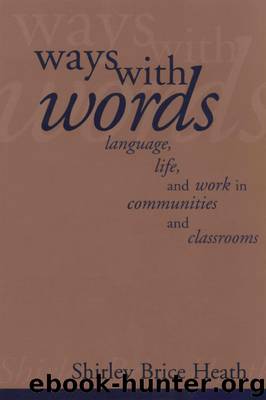Ways with Words: Language, life, and work in communities and classrooms by Shirley Brice Heath

Author:Shirley Brice Heath
Language: eng
Format: epub
Publisher: Cambridge University Press
Published: 1983-03-10T16:00:00+00:00
A question of degree and kind
Both Trackton and Roadville are literate communities and each has its own traditions for structuring, using, and assessing reading and writing. The residents of each community are able to read printed and written materials in their daily lives and, on occasion, they produce written messages as part of the total pattern of communication in the community. In both communities, the residents turn from spoken to written uses of language and vice versa as the occasion demands, and the two modes of expression serve to supplement and reinforce each other. Yet, in terms of the usual distinctions made between oral and literate traditions, neither community may be simply classified as either “oral” or “literate.”
Many authors have painted the contrast between “oral” and “literate” traditions in strong terms, emphasizing important differences in attitudes and behaviors. Most of these accounts, and many images in the mind of the general public, categorize communities as either literate or oral. Oral traditions are often considered as essentially the same, with only minor cultural differences, wherever they are said to characterize a society. Many accounts also tend to consider the forms and functions of literacy in a “literate” community as having certain universal characteristics. For example, many analysts of the social and individual functions of literacy limit their analyses essentially to the development of expository prose and closely related phenomena, or those literacy requirements most valued in the school and often automatically associated with the workplace. In Trackton and Roadville, there are multiple uses of written and oral language, and members have access to and use both. Spontaneous oral adjustments of written material often result in longer, more complex sentences with accompanying shifts in style from the formal to the more informal. Talk around and about written material incorporates personal or group experience; the highly personalized first person singular of the oral mode replaces the more formal, distant third person. Using the instructions to put together a toy or reading a letter from a daycare agency can provoke recitation of personal experiences or evaluations based on what one has seen, done, or been told by friends. What is written – whether it be obituary, recipe, or letter – calls up multiple specific cases, from which Roadville and Trackton members move to make generalizations and – sometimes – to decide on their own course of action. In each community, there are established patterns of language use around the written word: types of questions to be asked, listening behaviors to be observed, and types of talk by individuals or groups about reading and writing. It is impossible to characterize Trackton and Roadville with existing descriptions of either the oral or literate traditions: they are neither and they are both. Yet the forms, occasions, content, and functions of their reading and writing differ greatly from each other, and each varies in degree and kind from patterns followed by the townspeople.
Roadville residents use writing only when they have to, and view it as an occasional necessary
Download
This site does not store any files on its server. We only index and link to content provided by other sites. Please contact the content providers to delete copyright contents if any and email us, we'll remove relevant links or contents immediately.
Cecilia; Or, Memoirs of an Heiress — Volume 1 by Fanny Burney(32544)
Cecilia; Or, Memoirs of an Heiress — Volume 2 by Fanny Burney(31942)
Cecilia; Or, Memoirs of an Heiress — Volume 3 by Fanny Burney(31929)
The Lost Art of Listening by Michael P. Nichols(7490)
Asking the Right Questions: A Guide to Critical Thinking by M. Neil Browne & Stuart M. Keeley(5757)
We Need to Talk by Celeste Headlee(5608)
On Writing A Memoir of the Craft by Stephen King(4931)
Dialogue by Robert McKee(4386)
Pre-Suasion: A Revolutionary Way to Influence and Persuade by Robert Cialdini(4219)
I Have Something to Say: Mastering the Art of Public Speaking in an Age of Disconnection by John Bowe(3872)
Elements of Style 2017 by Richard De A'Morelli(3339)
The Book of Human Emotions by Tiffany Watt Smith(3300)
Fluent Forever: How to Learn Any Language Fast and Never Forget It by Gabriel Wyner(3077)
Name Book, The: Over 10,000 Names--Their Meanings, Origins, and Spiritual Significance by Astoria Dorothy(2978)
Why I Write by George Orwell(2944)
Good Humor, Bad Taste: A Sociology of the Joke by Kuipers Giselinde(2941)
The Art Of Deception by Kevin Mitnick(2796)
The Grammaring Guide to English Grammar with Exercises by Péter Simon(2738)
Ancient Worlds by Michael Scott(2682)
